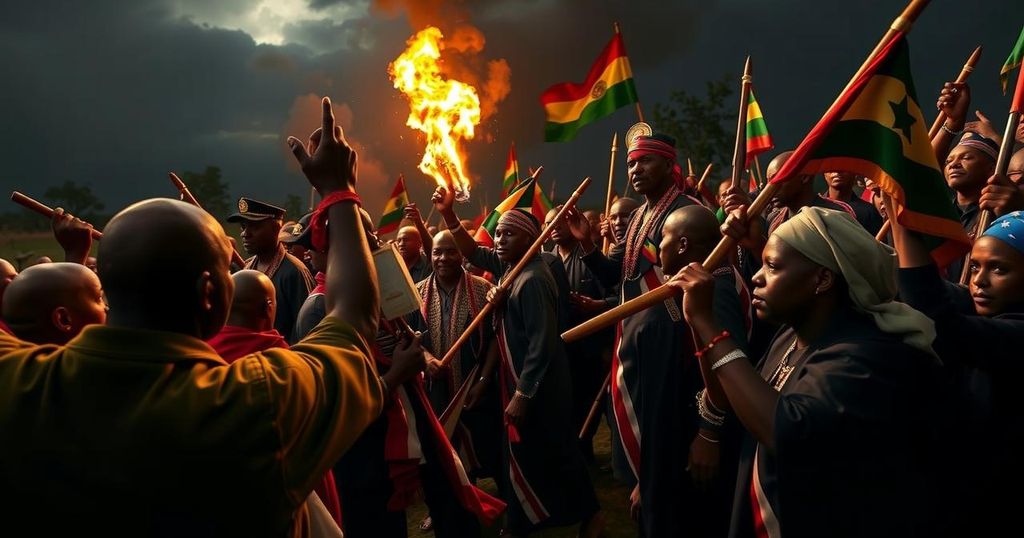South Sudan’s Prolonged Political Turmoil: A Fragile Path to Democracy

Africa’s youngest nation, South Sudan, faces stagnation in its path towards democracy as elections have been postponed to December 2026, largely due to power struggles among its leaders. Major General Charles Tai Gituai and UN Special Representative Nicholas Haysom noted persistent barriers to implementing the 2018 peace agreement. The lack of resources and political will raises concerns over the feasibility of meeting requirements for the next elections, amidst worsening internal and regional tensions.
The ongoing political landscape in South Sudan resembles a prolonged and intricate struggle for power, akin to a ‘Game of Thrones’. Following the fourth postponement of the nation’s inaugural post-independence elections, initially set for December 2023, prospects for establishing a democratic system appear increasingly bleak. An extension until December 2026 was announced as leaders from the transitional government, including President Salva Kiir Mayardit and Vice-President Riek Machar, exhibit a lack of urgency towards holding elections, prioritizing their own power retention over electoral progression.
Despite calls for adherence to the 2018 peace agreement, including remarks by Major General Charles Tai Gituai, Chairperson of the Reconstituted Joint Monitoring and Evaluation Commission, the government’s commitment remains questionable. He cited multiple barriers hindering the implementation of the agreement, such as insufficient political commitment and funding. Nicholas Haysom, the Special Representative of the Secretary-General of the UN, highlighted similar concerns, indicating that political interests have overshadowed the urgent need for elections.
The response from international supporters, including the United States, United Kingdom, and Norway, reflects disappointment over the postponement, attributing it to the political elite’s disregard for citizens’ welfare. African Union officials express a more restrained reaction, focusing on the continuance of the peace initiative. However, the delayed execution of the Tumaini Peace Initiative further complicates the situation, as infighting between Kiir and Machar stalls negotiations for including additional factions into the government.
Haysom advocates for decisive actions and compromises to meet the 2026 deadline, emphasizing the need for crucial electoral planning and the establishment of unified security forces. As echoed by analysts, practical obstacles, including constitutional reviews and census requirements, are predicted to hinder timely elections. Additionally, South Sudan’s dependency on oil revenue, critically impacted by the ongoing conflict in neighboring Sudan, tarnishes the country’s financial prospects.
In light of these challenges, the suggestion of an impartial caretaker government to oversee the elections emerges as a possible solution, should the current politicians agree to step aside. Nonetheless, recent discord within the government raises cautious optimism about the fragile peace prevailing in South Sudan. The situation continues to unfold, with the necessity for substantive political will and action more crucial than ever.
South Sudan gained independence in 2011, but has struggled to establish a stable governance structure, amid internal conflicts and power struggles among its leaders. The 2018 peace agreement aimed to bring about transitional governance and democratization within the country, yet repeated delays and the recent postponement of elections indicate significant barriers to advancing the political stability and development of democratic practices. The ongoing power struggle between key figures, particularly President Kiir and Vice-President Machar, exacerbates this situation, hampering progress towards a fully functional democratic system.
The postponement of South Sudan’s elections is emblematic of the deeper issues within its governance structure, revealing a chronic lack of political will among its leaders to pursue democratic practices. For meaningful progress to occur, substantial compromises and genuine engagement are essential from both political factions and international supporters. While potential avenues for electoral oversight such as a neutral caretaker government may exist, the overarching challenge remains: fostering the political climate necessary for a legitimate and inclusive electoral process in December 2026.
Original Source: www.eurasiareview.com







